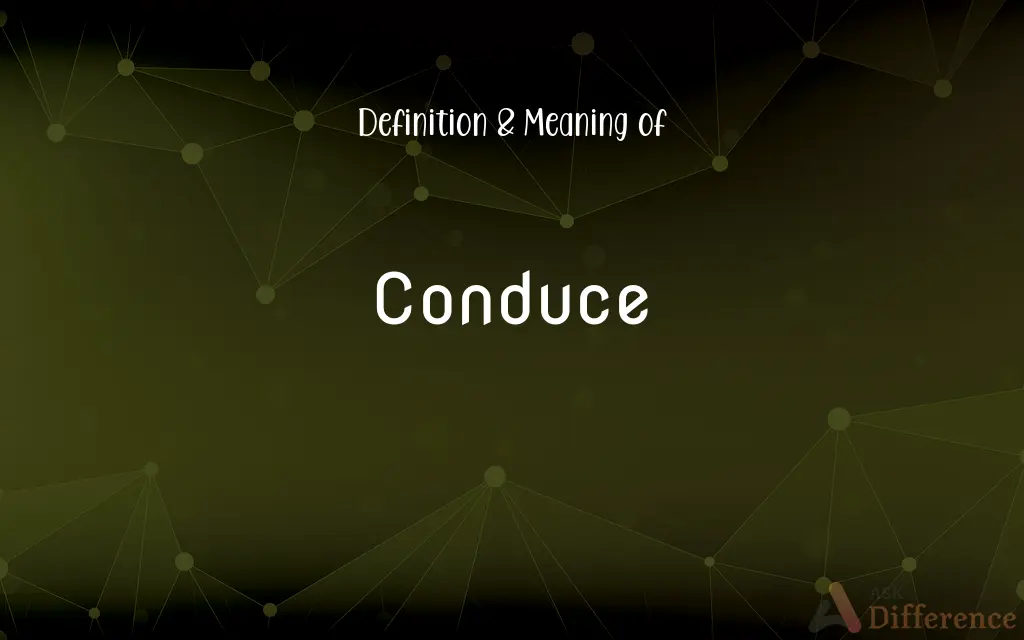Conduce Definition and Meaning
By Tayyaba Rehman & Urooj Arif — Updated on March 5, 2024
Conduce means to help bring about a particular result or outcome; to contribute to. e.g., Eating healthy foods conduces to overall well-being.

Table of Contents
Conduce Definitions
Facilitate Growth: To support or encourage growth or development.
Fertile soil conduces to robust plant growth.
Promote Well-being: To contribute positively to health or well-being.
Regular exercise conduces to a healthy heart.
Benefit Outcomes: To have a beneficial effect on outcomes.
Research and development conduces to innovation.
Aid in Achievement: To assist in achieving a goal or objective.
Teamwork conduces to the project's success.
Enhance Performance: To contribute to improved performance or efficiency.
Proper planning conduces to smoother operations.
Strengthen Relationships: To contribute to stronger or more positive relationships.
Shared experiences conduce to deeper friendships.
Support Success: To help in creating conditions for success.
Open communication conduces to a productive work environment.
Lead to Satisfaction: To lead towards personal satisfaction or fulfillment.
Achieving personal goals conduces to happiness.
Encourage Harmony: To foster a sense of peace or harmony.
Mutual respect conduces to harmonious relationships.
To contribute or lead to a specific result
"The quiet conduces to thinking about the darkening future" (George F. Will).
To contribute or lead to a specific result.
To lead or tend, esp. with reference to a favorable or desirable result; to contribute; - usually followed by to or toward.
He was sensible how much such a union would conduce to the happiness of both.
The reasons you allege do more conduceTo the hot passion of distemper'd blood.
To conduct; to lead; to guide.
He was sent to conduce hither the princess.
Be conducive to;
The use of computers in the classroom lead to better writing
Improve Understanding: To aid in gaining knowledge or understanding.
Discussion and debate conduce to a broader perspective.
Conduce Snonyms
Facilitate
To make (an action or process) easy or easier.
The new software facilitates project management.
Lead to
To result in; cause.
Healthy habits lead to a longer life.
Advance
To move forward; to develop or progress.
Research advances our understanding of diseases.
Enhance
To increase or improve in value, quality, desirability, or attractiveness.
Regular exercise enhances physical fitness.
Support
To keep up or add strength to.
The evidence supports the theory.
Promote
To help something happen, develop, or increase.
The campaign promotes healthy eating.
Foster
To encourage the development of something.
The program fosters an interest in science among young people.
Aid
To provide support for or relief to; help.
The guidebook aids tourists in finding the best spots.
Contribute
To give (something, such as time or money) to a common supply.
Volunteering contributes to community well-being.
Benefit
To be advantageous or profitable; to gain.
Eating vegetables benefits your health.
Conduce Idioms & Phrases
Conduce to understanding
To help in developing comprehension or insight.
Open communication conduces to understanding in complex negotiations.
Conduce to efficiency
To lead to or enhance the efficiency of a process or operation.
Streamlining workflows conduces to efficiency in the workplace.
Conduce to health
To promote or contribute to maintaining good health.
A balanced diet and regular exercise conduce to health.
Conduce to success
To contribute positively to achieving success.
Regular training and discipline conduce to success in any professional sport.
Conduce to learning
To aid or facilitate the learning process.
Interactive teaching methods conduce to learning more effectively than traditional lectures.
Conduce to harmony
To promote or bring about harmony in a group or environment.
Mutual respect and empathy conduce to harmony within a team.
Conduce to happiness
To lead or contribute to a state of being happy or content.
Spending quality time with family and friends conduces to happiness.
Conduce to peace
To contribute to the establishment or maintenance of peace.
Diplomatic negotiations often conduce to peace between conflicting parties.
Conduce to growth
To contribute to the growth or development of something.
Favorable market conditions conduce to the growth of startups.
Conduce to a solution
To help in finding a solution to a problem.
Collaborative problem-solving conduces to a solution more quickly than working in isolation.
Conduce to a better understanding
To contribute to a deeper or more comprehensive understanding of a topic or issue.
Thorough research conduces to a better understanding of historical events.
Conduce to innovation
To lead to or encourage innovative ideas or processes.
A creative and open culture conduces to innovation in technology firms.
Conduce to productivity
To enhance or contribute to increased productivity.
A well-organized workspace conduces to productivity.
Conduce to decision-making
To aid or facilitate the process of making decisions.
Accurate data and analysis conduce to decision-making in business.
Conduce to relaxation
To lead to or promote a state of being relaxed or at ease.
A quiet environment and soft music conduce to relaxation.
Conduce to safety
To lead to or promote safety in a particular context or environment.
Strict adherence to protocols conduces to safety in laboratory settings.
Conduce to a positive outcome
To contribute towards achieving a positive result or ending.
Teamwork and perseverance conduce to a positive outcome in challenging projects.
Conduce to stability
To promote or bring about stability in a system or situation.
Economic reforms can conduce to stability in volatile regions.
Conduce to enjoyment
To enhance or contribute to the enjoyment of an activity or experience.
Good company and fine weather conduce to the enjoyment of outdoor activities.
Conduce to clarity
To contribute to making something clear or understandable.
Precise definitions and examples conduce to clarity in academic writing.
Conduce Example Sentences
A balanced diet conduces to good health.
Quiet study environments conduce to better concentration.
Clean air conduces to a healthier community.
Sunshine and water conduce to the flower's growth.
Reading widely conduces to a rich vocabulary.
A well-organized workspace conduces to productivity.
Regular training conduces to increased stamina in athletes.
Financial stability conduces to peace of mind.
Positive feedback conduces to higher employee morale.
A calm demeanor conduces to effective negotiation.
Protecting natural habitats conduces to biodiversity conservation.
Fair play conduces to the enjoyment of the game.
Respectful listening conduces to meaningful conversations.
Practicing mindfulness conduces to mental well-being.
A supportive family environment conduces to children's confidence.
Common Curiosities
How do we divide conduce into syllables?
Conduce is divided into syllables as con-duce.
How many syllables are in conduce?
There are two syllables in conduce.
What is a stressed syllable in conduce?
The stressed syllable in conduce is the second syllable, "duce."
What is another term for conduce?
Another term for conduce could be "contribute" or "lead to."
Why is it called conduce?
It is called conduce because it means to contribute or lead to a particular result. The term comes from the Latin "conducere," meaning to lead or bring together.
What part of speech is conduce?
Conduce is a verb.
How is conduce used in a sentence?
"Eating healthy foods can conduce to overall well-being."
What is the pronunciation of conduce?
The pronunciation of conduce is /kənˈdjuːs/ in British English and /kənˈduːs/ in American English.
What is the root word of conduce?
The root word of conduce is the Latin "conducere."
What is the verb form of conduce?
The verb form is "conduce."
Is conduce an adverb?
No, conduce is not an adverb.
Is conduce a collective noun?
No, conduce is not a collective noun.
Is the conduce term a metaphor?
Conduce can be used metaphorically in contexts implying that something leads to a particular result or outcome.
What is the opposite of conduce?
The opposite of conduce could be "hinder" or "prevent."
Is conduce a vowel or consonant?
The question doesn't apply to the word as a whole; "c" in conduce is a consonant.
Is the word conduce Gerund?
The gerund or noun form derived from "conduce" would be "conducing," though it's not commonly used.
What is the singular form of conduce?
As a verb, conduce does not have singular or plural forms; it remains "conduce" regardless of the subject number.
Is the word “conduce” a Direct object or an Indirect object?
"Conduce" is a verb and thus does not serve as a direct or indirect object but can take a direct object, e.g., "Your actions conduce to the outcome."
Which vowel is used before conduce?
Articles "a" or "an" are not typically used directly before verbs like "conduce."
Which article is used with conduce?
Articles are not used directly with verbs like "conduce."
Is conduce a noun or adjective?
Conduce is a verb.
Is conduce an abstract noun?
No, conduce is a verb, not a noun.
Is conduce a negative or positive word?
Conduce is neutral; its connotation depends on the context in which it is used.
Is conduce a countable noun?
Conduce is not a noun; it's a verb.
Which conjunction is used with conduce?
Conjunctions like "and," "but," or "or" can be used in sentences involving "conduce."
What is the plural form of conduce?
Not applicable, as conduce is a verb and does not change form for plural subjects.
Is the word conduce is imperative?
Yes, conduce can be used in the imperative form, e.g., "Conduce to the team's success."
Which determiner is used with conduce?
Determiners are not typically used directly with verbs.
Which preposition is used with conduce?
The preposition "to" is often used with conduce, e.g., "conduce to success."
Share Your Discovery

Previous Term
Posing Definition and Meaning
Next Term
Jog Definition and MeaningAuthor Spotlight
Written by
Tayyaba RehmanTayyaba Rehman is a distinguished writer, currently serving as a primary contributor to askdifference.com. As a researcher in semantics and etymology, Tayyaba's passion for the complexity of languages and their distinctions has found a perfect home on the platform. Tayyaba delves into the intricacies of language, distinguishing between commonly confused words and phrases, thereby providing clarity for readers worldwide.
Co-written by
Urooj ArifUrooj is a skilled content writer at Ask Difference, known for her exceptional ability to simplify complex topics into engaging and informative content. With a passion for research and a flair for clear, concise writing, she consistently delivers articles that resonate with our diverse audience.

































